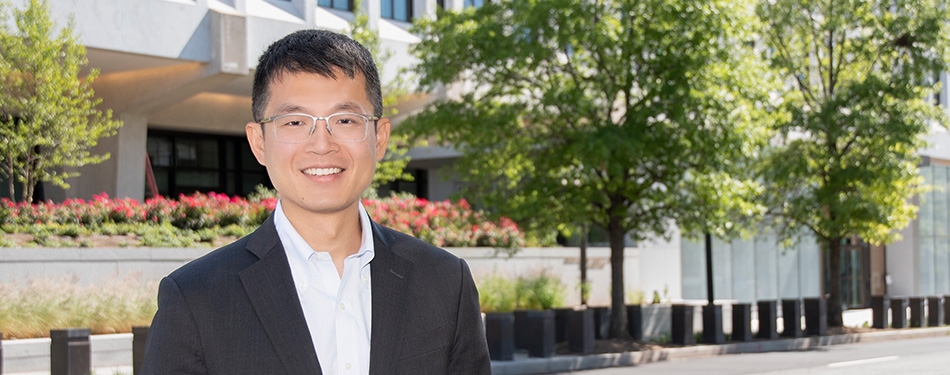Washington economist and lawyer Jeffery Zhang joins Michigan Law faculty.
Jeffery Zhang has met many talented alumni of the University of Michigan Law School who have come from Ann Arbor to Washington, D.C.; more specifically, to the Federal Reserve, where Zhang has worked for the past five years.
Now the tables are turned, and Zhang is leaving the Washington Beltway to move to Ann Arbor, where he will serve as an assistant professor of law at Michigan Law.
At the Legal Division of the Federal Reserve, I had my lawyer hat on. At the Council of Economic Advisers, I had my economist hat on. These experiences…helped me approach issues and projects from different angles.
“All of the Michigan alums at the Federal Reserve are excited that I’m going to the Law School,” he said.
Zhang―who received his PhD in economics from Yale University the same week in 2017 that he was awarded his JD from Harvard Law School―has earned solid credentials as a practicing lawyer and an economist specializing in financial regulation.
Serving at the Federal Reserve and the White House
At the Federal Reserve, Zhang first served from 2017 to 2019 as an economist in the Special Projects Unit of the Division of Supervision and Regulation, where he worked on domestic rulemakings, international regulatory coordination, and policy research projects.
Then he switched functions to become an attorney in the Legal Division from 2019 to 2022, where he addressed banking regulatory matters and helped in the creation and implementation of the Federal Reserve’s emergency lending facilities during the COVID-19 pandemic.
During his graduate studies and his time at the Federal Reserve, Zhang served as a staff economist at the White House Council of Economic Advisers for the Obama administration from 2012 to 2013, where he focused on energy and macroeconomics.
He later served as a senior economist in the Biden administration, where he focused on digital assets, financial markets, and housing.
“In the Legal Division at the Federal Reserve, I had my lawyer’s hat on,” Zhang said. “At the Council of Economic Advisers, I had my economist’s hat on. These experiences allowed me to develop my expertise in both disciplines, law and economics, and helped me approach issues and projects from different angles.”
Teaching the law and economics of financial regulation and digital currencies
At Michigan Law, Zhang plans to focus on teaching the nuts and bolts of financial regulation and digital currencies while enriching classroom discussions with lessons learned from his own broad-based experiences and multidisciplinary perspective as a D.C. lawyer and economist.
“In all my classes, I want to make sure I give students a broad portfolio of tools they can use to answer questions or fix problems,” he said. “If I am discussing a particular concept, I want to explain both the legal theory and the economic theory behind it and then contextualize it in the real world as a practicing lawyer or a policymaker.”
In the 2023 winter term, Zhang will teach a seminar called “The Future of Money,” in which he will discuss banking and digital currencies, such as cryptocurrencies, stablecoins, and central bank digital currencies.
As a researcher, Zhang expects to continue his exploration of the financial regulation field and to investigate new questions he has not addressed before.
He has delved into wide-ranging topics, such as the systemic risk of stablecoins, lessons from the 2008 and 2020 financial crises, the law and economics of “soft dollars,” and the asymmetric impact of the strategic petroleum reserve on crude oil prices.
“I’m looking forward to working with talented colleagues at Michigan Law and to pursuing co-authored projects and other deep dives with them,” Zhang said. “When I came to the Ann Arbor campus for my initial interview, I was struck by how friendly and engaging the Michigan Law faculty are. The professors I met were super-sharp intellectuals but also super-kind individuals. That’s rare.”
Zhang firmly believes that the role of an educator should extend well beyond the boundaries of the classroom.
“Continuing the mentorship of Michigan Law students after the class is over will make their academic and professional experiences more rewarding,” he said.
—Claudia Capos

